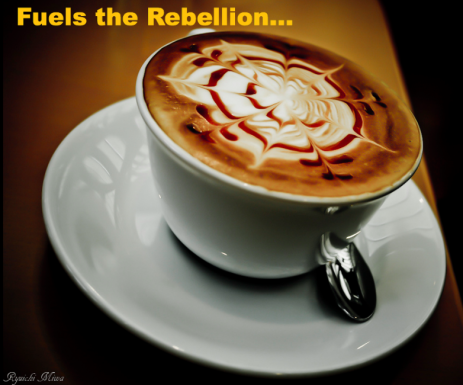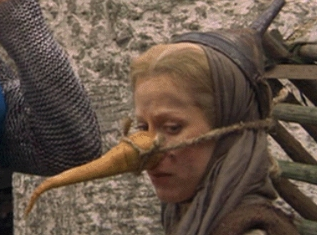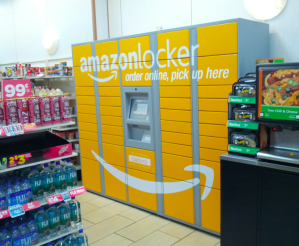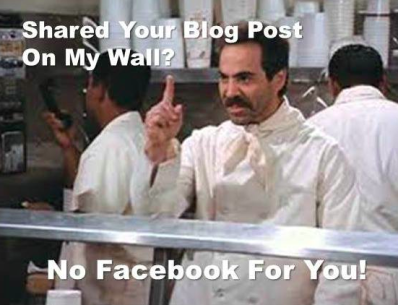The Burst of the Social Media Bubble, Rise of the Indie Author & Why Coffee is to Blame
(Original image courtesy of Matthew Pearce via Flikr Creative Commons.)
Many of you are old enough to remember the dot.com boom (then bust) of the 1990s. The Internet was growing in popularity. More people were owning PCs and commerce was shifting on-line. The Old Guard yelled “WITCHCRAFT!”, threw holy water and shorted out their keyboards. The New Guard dived in with the enthusiasm of a kid at Chuck E. Cheese hopped up on sugar.
Creativity abounded. What products or services could be offered on-line? How could we improve the on-line experience? How could we make purchasing faster, safer, more appealing?
Early Adopters jumped all over this because that’s what Early Adopters do. Hey, someone had to be the first to eat an oyster, right?
The Early Adopter Instigator
Most revolutions begin with other revolutions that set the stage. Case in point. For centuries, water was unsafe—okay deadly—to drink. Most workers actually brought beer to work (or some other fermented drink). Then Western society took a fancy to this new beverage from Asia called TEA and then later COFFEE from South America. When tea and coffee (um CAFFEINE) replaced alcohol as the beverage of choice, workers were more productive.

Image courtesy of Ryu1chia Miwa via Flickr Creative Commons
I was skeptical too, so I tested beer then coffee to make sure the empirical data was sound. When I began my workday with beer? Much more napping and looking up exes on-line. A double Starbucks espresso improved word count.
Joking aside, three major developments 1) the invention of the clock/watch 2) the standardization of time and 3) the shift from alcoholic beverages to caffeinated ones laid the foundation for the Industrial Revolution.
The eight-hour workday was easier to implement once people understood what the heck “an hour” was. Also, laborers were able to focus better and be far more productive when sober.
Science :D .
Fast-Forward—How Coffee Transformed the Publishing Paradigm
Coffee not only fueled the Industrial Revolution, but apparently staying up all night unable to sleep led to the invention of the “computer,” “the Internet,” and later “iTunes.” The shift from “going to a physical store” commerce to more “e-commerce” set the stage for a number of unanticipated revolutions in the arts. If we think about it, when did the mega-bookstore enjoy its Golden Years?
Hint: Right about the time of the movie You’ve Got Mail, clearly marking the brief historical epoch when we actually enjoyed getting e-mails.
In the 90s, the retailer was still king (and the Internet a novelty). Thus, the biggest store with the most bells and whistles and coffee shops won. Why? For centuries we’d been conditioned to going to a physical space to shop. Only the Early Adopters were thumping their legs at this notion of buying stuff without having to drive anywhere.
Granted, this was also the time when SUVs the size of a small semi were all the rage and gas was roughly $1.25 a gallon. Most of us were uncomfortable with the hoo-doo-voo-doo of electric lighting automobiles on-line shopping and still preferred to GO somewhere to buy what we wanted/needed.
Yet, despite initial skepticism, the tsunami of technological innovation decimated many types of businesses, some that had been asking to be smacked for a LONG time. Technology gave beating to the Old School phone companies (cell phones) and wiped out record stores (iTunes) and then later obliterated video stores.
Frankly, Blockbuster had it coming with those ridiculous late fees. Every time I see a Red Box I smile and think of the time Blockbuster refused to work with me on $128 in late fees. Apparently spending four days in the hospital was no excuse for not turning my movies in on time.
Jerks.
The Bursting of the Dot.Com Bubble
Of course, the problem was enthusiasm often has this way of trumping business sense. Once the dot.com fire caught light, everyone was a dot.com and many were nothing more than paper dragons with no business plan, no capital and frankly no idea what the heck they were doing.
We enjoyed a boom and then saw a BOOM. Dot.coms that had their act together became the vanguards for a new age of commerce and the digital wheat was separated from the virtual chaff.
In the wake of the Digital Tsunami, many industries crumbled. In my POV, the music industry is the only one that had a valid excuse not to reinvent. But, after Tower Records toppled, Kodak had time to rework their business model and yet didn’t—People will always want film!—which is why we now will talk of Kodak to our kids the way we talk about cassette tapes and Pet Rocks.
Viva la Revolution
We had to have the Alcoholic Beverage vs. Coffee Revolution to gain a viable and productive Industrial Revolution.
****Rumor has it that writers were equally divided Alcohol/Coffee Debate.
Then, we had to have affordable PCs and a viable Internet to have the On-Line Shopping vs. Retail Space Revolution in order to gain digital commerce. Once digital commerce shifted from Early Adopters to the Early then Late Majority, we witnessed yet even more revolutions spark to life, revolutions that had no way of happening until that particular time in history.
All started by coffee. See the cool stuff you learn here?
Many of these upheavals completely altered the business landscape, and the creative industries saw MAJOR shifts. Indie Bands, Indie Movies and yes, Indie Authors.
Word on the street is that Indie Authors are being supported by an underground resistance financed by Starbucks.
The Social Media Bubble
In roughly 2003-2004 I saw what a major game-changer social media would be for authors. Up until that point, only non-fiction authors had any practical way of building a platform before a book was finished. Novelists had to write a lot of books (and make it past NYC gatekeepers) to have a platform because books were the only way of having a platform/brand.
But with social media? Different story.
Of course when I pitched this idea of branding through social media to agents as late as 2008, they laughed in my face and called me a witch.

I just said we needed both good books and social media.
Alcohol vs. Coffee —> Industrial Revolution —> Internet —> Commerce Revolution/ Dot. Com Boom —> Tower Records Collapses —> Kodak Collapses —> iPad and Nook released —> Amazon gains publishing influence —> Early Adopters defect to go Indie —> Social Media Boom —> Indie Authors start seeing success —> Borders closes and Barnes & Noble starts bleeding out—> Big Six becomes Nifty Five —> Author Boom
Three components were critical to the success of the Indie Publishing Revolution:
1) Creation of the Product
Ten years ago, this was a pipe dream. Five years ago, self-published books looked self-published. They were also far more expensive and complicated to produce. Technology and the market has transformed this. Authors can now create a book that looks as good as anything purchased from the last remaining B&N in your city (without going broke).
2) Distribution
So long as major retailers had the upper hand, authors were limited in sales. As e-readers shifted from the Early Adopters to the Early and Late Majority (my GRANDFATHER having a Kindle), retailers lost their monopoly.
3) Visibility
Social media helped authors build a brand and platform that could drive book sales even as traditional retailers began to vanish. Social media BOOMED.

For those who want a paper copy to hold…
Social media experts came out of the woodwork to assist writers. It seemed that just about the time a social media site was AWESOME, it collapsed, so we did need guides to help.
Has the Social Media Bubble Burst? What Does This Mean for Authors?
My opinion is we’re seeing a bubble burst that looks a lot like what happened to the dot.coms. Social media has reached an asymptote (not many “drastically new” features to add). Unless Facebook does something EPICALLY STUPID, it will probably remain. Same with Twitter. Fad frenzy has normalized and this new way of interacting has integrated into our culture.
Yes, new sites will emerge, but the rules of the game will stay the same. Since it is social media, those who are authentic, offer value, and are good at creating community will do well. Algorithmic alchemy doesn’t work as well as it used to and never worked long-term.
The handful of writers who adopted social media early did reap rewards. Why? Most other authors didn’t want to go there. This limited competition and gave the Early Adopter Authors an advantage. Most people were on Facebook, yet many authors were NOT.
Then, authors saw the success of the Early Adopter Authors and many a social media guru promised get-rich-quick programs….thus flooding every social site with book spam and bad 20th century marketing retreads. Experts terrified and bedazzled authors with tech-speak and marketing plans.
Yet, in the end, technology is the means not the ends, and society has fundamentally shifted yet again. As I’ve said before, “If we wanted to buy more stuff, we’d be on the Home Shopping Network, not the social network.”
Social media has become such a staple in modern culture we’re finally establishing concrete etiquette for using it. Kinda like, the “Don’t call people before 8:00 a.m. or after 9:00 p.m.” probably didn’t come about the instant the telephone was invented.
Yes, there were “rules” we knew intuitively, but it took a couple years of poor behavior for us to say, “ENOUGH. I’ve had four direct messages from you on Twitter thanking me for the follow and asking for me to buy a book….UNFOLLOW.”
Pop! Goes the Bubble
Is social media essential for author success? Of course it is. Just because a gazillion dot.coms went under doesn’t mean on-line shopping isn’t bigger than ever. As with any revolution, it takes a lot of people jumping in with new ideas to sort the stinkers from the stickers. Buying books on-line? YAY! Grocery shopping on-line? Eh.
We still want to squeeze the Charmin tomatoes.
What I love about the new paradigm is it will test our motivations. Those writing for the wrong reasons (getting RICH) will probably burn out and grumble away. But those of us writing because we LOVE writing will keep pressing, keep working, keep connecting, and trying new things. We will be the new generation of authors no matter the path we choose—traditional or non-traditional.
Social media training will be less about technology and more how to become expert connectors and community-builders, which is what my latest book Rise of the Machines-Human Authors in a Digital World teaches how to do. So long as people buy on-line, social media (and doing it WELL) will remain a key component to success.
But creating relationships has always been a solid business practice. Maybe buy them a coffee ;) .
I love hearing from you!
What are your thoughts? Did you underestimate the power of coffee to change the world? Do you think social media has normalized like on-line commerce? Do you think regular people are becoming more aware of an existing etiquette? Are you less permissive of “rude” behavior you might have forgiven three years ago?
To prove it and show my love, for the month of APRIL, everyone who leaves a comment I will put your name in a hat. If you comment and link back to my blog on your blog, you get your name in the hat twice. What do you win? The unvarnished truth from yours truly. I will pick a winner once a month and it will be a critique of the first 20 pages of your novel, or your query letter, or your synopsis (5 pages or less).
Upcoming Classes
BOTH CLASSES COME WITH HANDOUTS AND FREE RECORDING.
A seasoned editor can tell a lot about your book with only five pages. Learn to hook hard and hook early. I am running the Your First Five Pages Class. Use WANA10 for $10 off. This is the perfect class for diagnosing bigger story issues or even getting a work agent-ready in time for conference season. This class is April 25th 6:00-8:30 PM NYC Time. Gold Level is available if you want me to critique your 5 pages.
Also, if you are struggling with plot or have a book that seems to be in the Never-Ending Hole of Chasing Your Tail or maybe you’d like to learn how to plot a series, I am also teaching my ever-popular Understanding the Antagonist Class on May 10th from NOON to 2:00 P.M. (A SATURDAY). This is a fabulous class for understanding all the different types of antagonists and how to use them to maintain and increase story tension. Remember, a story is only as strong as its problem ;) . Again, use WANA10 for $10 off.







